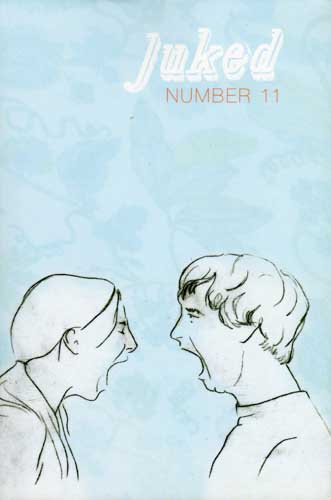Juked – Spring 2014
The editors of Juked state on their website that they do not adhere to any particular themes or tastes, but in this year’s issue, one might perceive a predilection for experimentation. Michelle Latiolais opens the volume with “Out,” which cannot be characterized in a single clause, but links together a complicated narrative almost without any kind of literary seam showing. Reportage of a world caramelized with sex, friendship, and the idiosyncrasies of place and a specific time sets the work apart in a shifting carnival; one is suspended between effective ‘reportage’ and the sequined world of the author’s imagination. The editors of Juked state on their website that they do not adhere to any particular themes or tastes, but in this year’s issue, one might perceive a predilection for experimentation. Michelle Latiolais opens the volume with “Out,” which cannot be characterized in a single clause, but links together a complicated narrative almost without any kind of literary seam showing. Reportage of a world caramelized with sex, friendship, and the idiosyncrasies of place and a specific time sets the work apart in a shifting carnival; one is suspended between effective ‘reportage’ and the sequined world of the author’s imagination. For example, she describes the evening with almost Kerouac’s eye, capturing “a skyline of dark pineapples.” Later, on a misogyny that has pervaded modern American culture:
. . . and she herself is now a Cougar . . . even a television program by that name, hot middleaged women on the make, and she marvels that widowed she is now made into a sexual predator, and indeed, men now hurry to inject “my wife” into an exchange of niceties, and if she is talking to a man at party, particularly if they are laughing, the conversation lively, the wife is there by his side quickly, staking her claim.
If becoming a middle-aged woman makes one eligible for savage reduction to some kind of “mythical creature,” as Latiolais observes, it is also an opportunity to speak—she wields a wide brush, capturing “Mexican wrestling,” the Mayan Theater and a man whose public urine is a “lovely Seventeenth-Century-Formal-Garden-Fountain-With-Pissing-Putti arc.” She does not reduce her narrative to an easy response to misogyny, and the choice is apt since one must answer subtle with subtlety. Literature this subversive should be on every woman’s shelf, for it is not only a room she needs, but a revolution.
Forrest Roth may have the literary flame one needs for any sensible laboratory—Roth’s “Seven Books by Alfred Hitchcock” rattles with a first sentence that slays me: “Margot knows she shouldn’t have taken Halliday’s crime novels with her to Death Row . . .” And so begins a warbling that crosses genres, fates, and realities. Truth, balanced in the literary sphere, may be the preoccupation of the memoir generation—and Roth plays with this theme delicately. Margo “still determines whether she’s indeed a murderer,” a séance of truth. Roth classifies this compelling philosophy as “Dial M for Murder,” a subset of the Hitchcock vignettes. Roth expands the gentle franchise of truth throughout the 7-part series—which one can link to the big question, what is real—as follows: “She imagines the premise based upon a simple man obsessed with, oh dear, let’s say, his moustache; then, one day, he inexplicably shaves it off, and everyone—everyone!—becomes aware of his existence.”
It is a story within a story, filtered through two lenses. A dual lens heightens the separation of dramatic action and the reader’s reality—a divide well-housed in Roth’s close third person. The reader slips between the gates of fantasy—Hitchcock’s, the writer Halliday’s, Margot’s—in a compact paragraph—as Roth’s Margot notices on a different level, “the book again becomes a newfound superstition.”
Rumaan Alam channels truth through a classical surrealism, where her narrator becomes a fox, falls in love, suffers great psychological pain, and regains her humanity by virtue of crying. The narrator remarks “I wept, and the weeping made me into a woman again.” Metaphor and the fantastic always evoke great emotional investment, and when the fantasy falls apart by virtue of any reasonable device, the reader does too. Out of all of the Juked’s stories, this one seems the most truthful because it is so direct, the simplicity betraying the rawness of feeling.
Juked’s interviews were true in a different way; there is an economy to the dialogue between Juked Editor J.W. Wang and James Scott (The Kept) and between Michael Barach and Sandra Simonds (Mother Was a Tragic Girl). The questions are focused, and the responses efficient enough that one learns the important lessons that only a master can impart. For example, James Scott advises that one put a draft down on paper as quickly as possible. “That initial spark—that first blush of inspiration—is tough to recapture if you put it down for too long.”
The final ‘true’ story in a book predominantly poetry and fiction was Jen Beagin’s “The Blind Pig.” The dialogue, which is pitch perfect, creates a ‘script’ even though the story is told in the first person. What is authentic, or actual, is woven together with quotes and facades. The poetry of Charles Simic and Sylvia Plath stand in for personal confessions in an environment of psychotherapy in New York—a strange construct, perhaps, but not outside the world of individuals seeking help when nothing else works, and their escape route is a nightmare of fraud and abuse. The pacing and sinews of plot are remarkable, the message well-developed, the experience of a post-electroshock dystopia, as I read it, so real you could reach through the page and feel it.
[www.juked.com/index.html]





